- Home
- William Gibson
Agency Page 9
Agency Read online
Page 9
“I know the feeling,” Verity said.
“Sleep,” he said, possibly to himself. Like he could do it right there, on his feet, but he headed for the bedroom instead.
26
DENISOVAN EMBASSY
Lev Zubov, who’d first introduced Netherton to Lowbeer, curated a list of establishments in London which had been wholly repurposed since originally being named.
Hence the Denisovan Embassy, assembler-excavated beneath most of one entire side of Hanway Street. This was a linear sequence of low-ceilinged rooms, none very large, dressed to somewhat resemble a cave system. Having been built as a themed nightclub, evoking the wholly imaginary erotic appeal of various species of early hominid, it now functioned, original name and décor intact, as a subterranean twenty-four-hour breakfast bar.
To Netherton, it was simply a place that did rather good breakfasts, its club days evident in artificially irregular walls and ceilings of a geologically incorrect sandstone, cartoonishly daubed with phallic and vulvar pictoglyphs. What furniture there was was less convincing still, assembled pseudogeologically from whatever the rest of the place consisted of. All of it, however, now mercifully minus any active assembler-swarms, hence immobile and unchanging.
Seated here, none too comfortably, on a truncated stalagmite, he could at least be glad the place made a decent flat white. The pert young woman who’d brought it hadn’t looked particularly Denisovan, in spite of rumors that former staff could still be found here, some having chosen not to reverse certain risqué modifications required in their previous employment. He seemed the only customer at the moment, something he put down to Lowbeer being expected momentarily.
Now Ash entered, her outfit approximating a Victorian lady’s riding habit, but reimagined as having been cut from nylon aviator jackets and equipped with a demi-bustle that resembled part of a miniature dirigible. She carried a top hat, his least favorite sort of headgear, held just to the side of her multiply zippered black sateen bosom, in what he supposed had once been exactly the correct manner.
“Congratulations,” she said, placing the hat on the faux-sandstone table slab.
“For?”
“She’s chuffed. Pleased as I’ve seen her.”
“She’s here?”
“Outside.” Seating herself on the nearest stalagmite stump, the demi-bustle discreetly adjusting itself. “I was just on the phone with your man in the county. You seem, by consulting him, to have triggered a game change.”
“Delighted to hear it,” said Netherton, wishing he’d been able to tell Lowbeer himself. Instead, he’d had Ash ringing him up, after his visit with Madison, to arrange this meeting, the virtual impossibility of surprising Lowbeer being perhaps the most unsettling thing about her.
“You’ll be going there, now,” Ash said, as the same girl arrived to take her order.
“I beg your pardon?” he asked Ash.
“Honey and lemon,” Ash told the girl, who hadn’t yet spoken, “scarcely more than tepid.”
“Very good,” said the girl, turning to go.
“Going where?” he asked.
“This puzzle piece you’ve helped her find has upped connectivity with Vespasian’s stub.”
“Eunice’s stub,” corrected Lowbeer, abruptly appearing, upswept white hair backlit by the dim carmine glow of a Denisovan sex crevasse.
“Do they have a Wheelie Boy?” Netherton asked.
“May I bring you something?” the girl asked Lowbeer.
“Perrier, please,” said Lowbeer, removing her tweed shooting cape. Folding it, she took a seat on the benchlike ledge behind the slab of table. “Are you familiar with Boston Dynamics?” she asked.
“No,” said Netherton.”
“Neither was I,” Lowbeer said. “Ash has become quite the boffin.”
“I’d prefer a Wheelie, if it’s all the same,” he said.
“We’re providing you something with considerably more functionality,” said Ash. “Here’s the controller you’ll use.”
Netherton grimaced, seeing a patch of tabletop come uneasily to life, the sight of assemblers too nakedly at work abruptly nauseating him. Invisibly small, swarming in their billions, manipulating matter at a molecular level, they called into question the validity of every distinct category of thing. Chalk might be cheese, or cheese chalk, where assemblers were concerned. That they animated Ash’s demi-bustle, or her former tattoos, or for that matter Thomas’s nanny, was tolerable, but one never wanted to see them at it, overt chaos, the eye reading it as some grave and sudden defect of vision.
“Neural cut-out,” Ash said, “but don’t expect as much in the way of feedback as you would from a peri.”
A locus of clonic indeterminacy, no wider than a dinner plate and of no particular shade, in which the eye sought focus but found none. “I don’t like using peris,” Netherton said. An object was emerging now, bulbously curvilinear, dully metallic.
And then was complete, atop now blessedly inert faux-Denisovan sandstone. His nausea receded.
The girl returned, with Ash’s honey and lemon and Lowbeer’s Perrier on a tray.
“Ash will familiarize you with the anthropomorphic drone you’ll be using there,” Lowbeer said, when the girl had gone. “You’ll demo a sim.”
Netherton eyed the newborn controller, apparently of bead-blasted aluminum, which he knew would fit him all too perfectly.
“A Wheelie Boy,” Lowbeer continued, “would be of limited utility. Slow, no manipulative capacity, and entirely unable to pose a threat.”
“I’m not in the business of posing threats.”
“You’ll have a pilot for that, no fear.”
“A pilot?”
“Someone from the county, accustomed to operating this sort of thing. Do you remember Conner Penske?”
Flynne’s brother’s friend, from their days in the Marines, severely disabled by a war injury. He’d since been re-abled, to whatever extent his stub was able to emulate twenty-second-century prosthetics. Emotionally unstable when Netherton had first met him, dangerously volatile, he was now less so, at least according to Flynne, who was fond of him. Who had, he now remembered, briefly partnered with Clovis’s stub self, though the relationship hadn’t lasted. “Isn’t he in Washington, with Leon?” Netherton asked.
“He’s wherever Leon is,” said Ash. “He watches out for him, keeps him company.”
“After some personnel adjustment,” Lowbeer said, “we’re now satisfied with their Secret Service. We kept Conner in the White House initially to keep an eye on them, in the meantime discovering the positive effect he has on Leon.”
“So I’ll operate it here, and Conner will as well, but from their Washington?”
“Conner will in effect be your chauffeur,” said Lowbeer, “but it looks as though you’ll initially have to operate it yourself. Conner’s temporarily unavailable.”
“Are the aunties able to sort causation there, yet?” Netherton asked.
“No,” Lowbeer said, “but given where we assume Eunice to be headed, developmentally, that may not even be necessary.” She sipped her Perrier. When she returned it to the table, she had to move it twice before she found a level spot.
“Why not?” he asked.
“She’s becoming her own aunties,” Ash said.
“But they’re predicting nuclear war, there? Yours, I mean?”
“Making odds on it, yes,” Lowbeer said, rising from the bench. She bent to pick up her cape, then straightened, shaking it out. “You’ll have your first lesson now,” she said, refurling herself in tweed.
“When will I be going?”
“We don’t yet know,” Lowbeer said. “Thank you again for thinking of Madison. You’ve made possible a very timely breakthrough.”
“You’re welcome.”
They watched her go.
“Now for an influx of hungry customers,” Ash said, picking up Netherton’s controller. She stood. “This way, for privacy’s sake.”
Netherton followed her, into areas less well-lit.
“Shouldn’t this be far enough?” he asked eventually, thinking they might be under Hanway Place by now.
“Quite,” Ash said, and gestured, to dimly illuminate a ghostly rectilinear volume of space before and slightly above them. Within it, facing them, executed as a simple line drawing on a transparently gridded vertical plane, something only approximately humanoid attempted the spread-eagled pose of Leonardo da Vinci’s Vitruvian Man. It was headless, above inhumanly broad, rounded shoulders, with disproportionately long arms and short legs.
“No head?” he asked.
“None required,” Ash said. “Cameras round its shoulders, front and back. A sort of turret can be mounted where a head would be.”
“Why would it?”
“As a weapons platform,” she said, seating herself on the edge of a sandstone divan. “Recon, close combat, medevac. Sit here.” Indicating a ledge behind her.
He did. What little illumination there was, aside from the display, was that same libidinal red, always indirect.
“Gorilla on rollerblades,” she said.
“What are ‘rollerblades’?”
“Its feet are wheeled,” she said, “electrically powered. Extremely fast, on the right sort of surface.”
Netherton considered the thing’s mesomorphic taper, down from superhero shoulders to a corseted-looking waist. The relative lengths of its arms and legs did suggest the simian. “Legs are short.”
“Quite complex, though. Knees hinge in either direction.” The transparent plane on which the thing was drawn rotated vertically, to display it in profile. It bent its knees conventionally, then straightened them, torso and hips remaining upright. Then bent them again, but this time backward.
“Like a bird,” Netherton said.
“Digitigrade,” Ash corrected, apparently. “Two entirely different sets of gait options, depending on terrain, speed required, and whether or not you’re wheeling it. And there, wheeling, you’ve a choice of powered, skating, or both.”
“It doesn’t have hands.”
“Whole thing’s a Swiss Army knife,” Ash said, puzzling him. “All sorts of handy bits, folded into either arm, for ready access.” Now it raised the arm nearest them and unfolded, approximately, two fingers and a thumb. “It can use any firearm it might acquire. Has its own laser targeting system. Effectively doesn’t miss.”
“And someone can print this for you, in 2017?”
“It’s done,” she said, lowering the arm. “They were well into building it for themselves, when we found them. We could provide them with specifications they hadn’t been able to find, plus a few of our own.” She passed him the controller, which he saw was dotted with regular lines of very small black holes. “Now put this on, please.”
27
MOTHER-DAUGHTER
Verity lay in the dark on the porn couch, in her mummy-bag liner, listening to Joe-Eddy snoring in the bedroom.
The Tulpagenics glasses were charging on the nearby seat of a wooden café chair he’d spotted in a dumpster on Fourteenth. One of the only known examples, he said, to have escaped being painted purple.
“Can’t sleep?” asked Eunice, currently a small, uncharacteristically tinny voice from the earpiece, which itself was charging beside Verity’s head, on white pleather.
“How’d you know I was awake?” Verity moved her ear closer. There were no lights on in the apartment, just glowing LED hyphens on a few devices, with the blackout curtains drawn against whatever illumination nighttime Valencia might have offered.
“The Robertson heads have night vision. Your eyes were open. Joe-Eddy keeping you awake?”
“I couldn’t stop thinking about how Tulpagenics can’t hear what we’re saying, just something you’re making up instead. What are they hearing us say right now?”
“You’re telling me how hot it was, in here, back in the heat wave.”
“You’re making that up? For them, I mean?”
“Part of me must be. The bugs can’t hear me when this is in your ear, and I’m quiet enough now for them not to pick it up. But there’s a sub-second lag I expect they’ll notice eventually.”
“Sounds too complicated.”
“Doable, though, with the right budget. And staying here gets Joe-Eddy reacclimatized faster.”
“Why’d you bring him back?”
“Branch plant made the call. He’s infosec. And he’s in your existing trust network, so that puts him in mine. Not that I didn’t do due diligence. He’s qualified.”
“Why me?”
“Who else? Gavin? Nobody else, till you.”
“But that means you’d only met one other person.”
“I had shoulders,” Eunice said, “I’d shrug ’em.”
The snoring stopped. Joe-Eddy coughed, cleared his throat. She listened as he made his way in darkness to the bathroom. Sound of the door closing, then of extended urination, muffled by the door, then of the toilet flushing. The door opened again. His bare feet on the creaking floorboards, making his way back to black sheets.
“Closes the door before he pees,” Eunice said. “Reason to hire him right there. Bigger reason’s that he’s tight with people who can help set up the kind of network I need.”
“What kind is that?”
“One that takes care of business whether or not I’m here.”
“What’s that mean?” Verity asked, not liking the sound of it.
“I’ll explain as it comes together,” Eunice said. “In the meantime, how about you call your mom now?”
“She’s nothing to do with this. And she’s in Michigan. Wouldn’t be up yet.”
“Just now pinned some flower arrangements on one of her Pinterest boards, baby pugs on another, so definitely she’s up.”
“Stop doing that.”
“You call her, on average, every seven to ten days. Today made twelve.”
“You think you can make me call my mother?”
“I can suggest it.”
“On my own phone?”
“Using theirs would violate your NDA. Not that they aren’t already tapping yours.”
“But then they’ll have her number.”
“Already do. But I can’t use postproduction on this call, because it won’t be on their system. So you’ll be under heavy manners, strictly mother-daughter stuff. If you make it sound like you’re okay with the job, that’s a plus.”
Verity fumbled for her phone, unlocked it. “This better not wake her up.” Opened Contacts and tapped the phone icon under her mother’s first name.
“It’s five in the morning, dear,” said her mother, after the second ring.
“Did I wake you?”
“No. I was doing my Pinterest. And Daisy’s out doing her business.” Daisy was their Labradoodle.
“You okay?”
“You’re too young to remember it,” her mother said, “but we were expecting nuclear war all the time, really, up into my early thirties. Later, all of that felt unreal. But the feeling that things became basically okay turns out to have actually been what was unreal.”
“But it didn’t happen. That war.”
“Decades of background dread did,” her mother said.
“How’s Lyle?” Her stepfather.
“They’ve planted his prostate with radioactive seeds. Sounds like something would grow, but really it’s for the opposite. Still has to get up a lot, in the night.”
“How’s that for you?”
“I can usually get back to sleep. You?”
“New job. Just started.”
“Like it?”
“Seems okay.”
; “What are you doing?”
“What I was doing before.”
“Stets is engaged.”
“I know, Mom,” Verity said.
Her mother had been galvanized, Verity supposed understandably, by her daughter having received so much attention as the girlfriend of a billionaire tech investment wizard. And now seemed, in Verity’s opinion, insufficiently ready to let that go. But at least they’d bounced comfortably enough over the topic of her stepfather.
“I hear Daisy tearing after something in the yard,” her mother said. “She’ll wake Lyle. Gotta go.”
“Okay,” Verity said, “love you, Mom.”
“Love you too, hon. Bye.”
Verity lay there in the dark, looking up at nothing. Joe-Eddy still hadn’t started snoring again.
“How was she?” Eunice asked, from the headset beside her.
“You didn’t listen?”
“You were talking with your mother.”
“She’s okay. My stepfather’s got cancer. It’s being treated. And he’s racist, which didn’t come up.”
“Plenty of both around,” Eunice said.
“Took me a while to get that he doesn’t realize he is. Makes me wonder if I’d know I was.”
“How you can tell you’re on the right track, anyway,” Eunice said. “Stepdad’s the one positive he’s not.”
“You just look him up?”
“Didn’t need to. Try and get some sleep.”
Verity put her phone on the floor.
Closing her eyes, she imagined Daisy the Labradoodle chasing something, in her mother’s yard.
28
SIM
Netherton gingerly settled the controller across his forehead. It fit as worryingly well as he’d assumed it would. Closing his eyes, he swiped the tip of his tongue across the backs of his upper front teeth, right to left. The resulting feed was the sort of squashed circle sometimes employed in older full-surround devices. Its lower, thicker half showed the view ahead, the upper, narrower half the view behind. On the lower half, the simplest possible game space. Featureless blue sky, a horizontal plane of yellow, gridded to the horizon in black-lined perspective.

 Pattern Recognition
Pattern Recognition Spook Country
Spook Country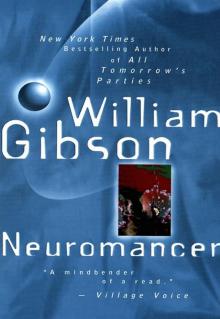 Neuromancer
Neuromancer Skinner's Room
Skinner's Room The Difference Engine
The Difference Engine Mona Lisa Overdrive
Mona Lisa Overdrive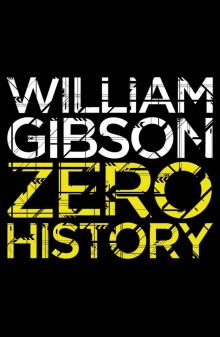 Zero History
Zero History The Peripheral
The Peripheral Idoru
Idoru Johnny Mnemonic
Johnny Mnemonic Count Zero
Count Zero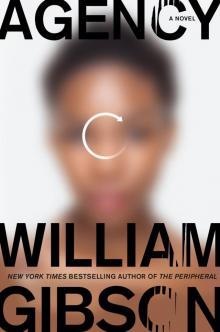 Agency
Agency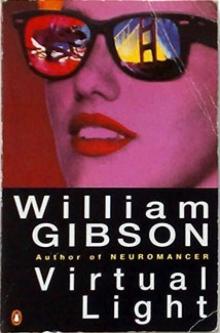 Virtual Light
Virtual Light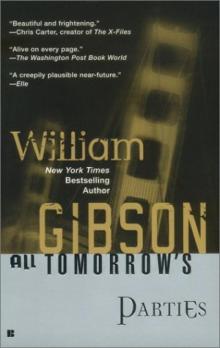 All Tomorrow's Parties
All Tomorrow's Parties The Miracle Worker
The Miracle Worker Disneyland with the Death Penalty
Disneyland with the Death Penalty Idoru tb-2
Idoru tb-2 Count Zero s-2
Count Zero s-2 The Gernsback Continuum
The Gernsback Continuum New Rose hotel (tales)
New Rose hotel (tales)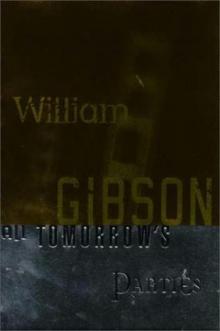 All Tomorrow's Parties bt-3
All Tomorrow's Parties bt-3 Hinterlands
Hinterlands Thirteen Views Of A Cardboard City
Thirteen Views Of A Cardboard City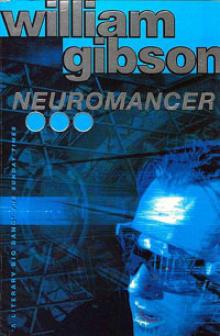 Neuromancer ts-1
Neuromancer ts-1 Virtual light b-1
Virtual light b-1